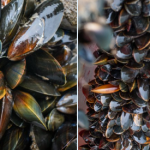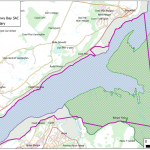Background
The eastern Menai Strait is the most important aquaculture site in all of Wales, and the single largest mussel farming area in the whole of the UK. The success of this area is due to the unique natural environment that is perfect for mussels; and also the legal protection (known as a “Fishery Order”) that was established in 1962 and which allows local mussel farmers to cultivate mussels here without the fear that they will be stolen by others. Hand gathering of wild mussels within the area is also covered by the Order.
Since devolution, the mussel fishery in the Menai Strait has been managed by the Menai Strait Fishery Order Management Association (MSFOMA), which was granted these powers by the Welsh Government in 2010.
2022: A new Fishery Order for the future
MSFOMA have worked with Welsh Government to ensure that when the old 1962 Fishery Order expired at midnight on the 1st of April 2022 it would be replaced by a new Fishery Order, to help Wales to maintain its leading place in UK aquaculture, and to secure long-term jobs and businesses in the local economy.
The new Order came into force on Saturday the 2nd of April 2022. It can be downloaded from the UK Government legislation website here. As before, the controls under this Fishery Order only apply to shellfish farming. It does not impose any new restrictions or controls on other day-to-day activities in the area. For shellfish famers this new Fishery Order is vital for their future. For everyone else in the area it will be very much “business as usual”.
The map below shows the extent of the new Fishery Order and the location of the “designated several fishery area” that has been established by MSFOMA with the Minister’s consent within the Fishery Order area. Mussel farming will only take place within this “designated area”.
A notice describing the “designated area” has been published by MSFMA and can be accessed here.
This new Fishery Order will remain in place for the next 35 years. More information about the Order and mussel cultivation in the Strait is presented below.
Further details
MSFOMA is an independent not-for-profit organisation. Its membership comprises 2 representatives of the fishing industry, and 1 representative from each of Natural Resources Wales, Gwynedd County Council, Ynys Mon County Council, Beaumaris Town Council, Bangor City Council and the University of Bangor. Welsh Government also attend the quarterly meetings and it is chaired by Alan Winstone, an independent fisheries expert from Anglesey.
A Fishery Order does not create any new fishing rights, but by privatising the fishing rights it allows for proactive management and cultivation of shellfish. It also can regulate the hand-gathering of wild mussels through a licensing system with appropriate conditions, such as minimum sizes and where and when harvesting takes place.
This does not affect anglers fishing on the shore or from boats, nor does it stop you from gathering worms or crabs to use as bait.
Mussel farming is done directly on the seabed – no nets or equipment are placed on the shore. Over the years the hand-gathering of mussels by licenced fishermen has also taken place from time to time when wild mussel numbers have reached harvestable levels.
About mussel farming
It usually takes 2 years for these seed mussels to reach market size. During this time the mussels may be moved from intertidal areas to subtidal areas by the mussel farmers to optimise their survival, growth, and quality.
Seed mussels settle from the plankton at these locations on to the cobbles and rocks left behind from the last Ice Age. To avoid damaging these vital seabed habitats, the mussel farmers wait until the young mussels have built up a layer of mud beneath themselves. This is typically in the period from August-October. After October the young mussels are swept away by stormy weather in the autumn and winter, leaving the cobbles and rocks exposed and ready for a new settlement of mussels the next year.

Small "seed" mussels on a beach
This process has repeated year after year for the past 50 years. In recent years the recruitment of seed mussels on the wild beds in Morecambe Bay and Caernarfon Bar has become less predictable, possibly as a result of climate change.
Mussel farmers are working with scientists here in North Wales to develop other ways of collecting seed mussels, which has proved to be a more reliable source of seed mussels in other countries – the pictures below show some of these mussels growing on ropes near to Puffin Island.

Seed mussels at experimental spat collector, Puffin Island
Mussel farmers are constantly working with scientists from Bangor University’s Shellfish Centre and Centre for Applied Marine Sciences to improve farming methods and ensure that the sustainability of the fishery is always improving.

MSFOMA and the shellfish farmers work closely with Natural Resources Wales to ensure that mussel farming is compatible with the legal requirements to protect wildlife and habitats within the SPA and SAC areas. We also work with scientists from the University of Bangor to study the potential impacts of mussel farming on the marine environment. Many of these studies have been published in scientific journals, and give mussel farming a clean bill of health.
